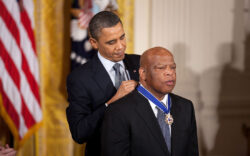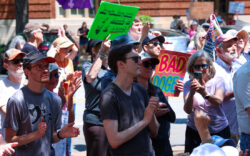She was called the Rebel Girl, and nearly 60 years after her death in 1964, Elizabeth Gurley Flynn still stirs controversy just as she did as a fiery young left-wing activist in the early years of the 20th century.
Born in 1890, Flynn gave her first political speech at age 15. For the rest of her life she championed causes that still have relevance today, such as peace, racial justice, women’s rights, and better wages and working conditions for Americans laboring in fields, factories, mines and mills. Flynn was an unabashed communist who nonetheless loved this country. She helped organize both the American Civil Liberties Union and the Industrial Workers of the World labor union, and she was arrested and jailed many times during her life of political protest.
Now Flynn is back in the news in her home state of New Hampshire. A May 18 New York Times story headlined “‘Rebel Girl’ Is Honored Until Protest By G.O.P.” detailed how Granite State Republicans torpedoed the installation of a historic marker honoring Flynn in her birthplace of Concord, NH. The marker had been installed in the town during a ceremony on May 1, the original workers’ holiday in America and around the world, but two weeks later it was taken down and placed in storage after Republicans in the “Live Free or Die” state went into a snit about honoring a woman who was both a left-wing firebrand and an American patriot.
Flynn earned her place in history, but in New Hampshire and around America, Republican politicians are leading the charge to ban books and sanitize history. Those who object to teaching American students the unvarnished history of this country’s racial and economic struggles aren’t about to honor a bold American dissident like Elizabeth Gurley Flynn, but even from the grave she may have the last word.
As a veteran of protests that challenged plutocracy and plunder in America, Flynn saw and lived history as it happened. Though jailed, beaten and vilified during her life, Flynn knew that she was part of a movement that would change history in America. “History has a long-range perspective,” she said. “It ultimately passes stern judgment on tyrants and vindicates those who fought, suffered, were imprisoned and died for human freedom against political oppression and economic slavery.”
Flynn earned her Rebel Girl nickname after activist songwriter Joe Hill contrasted working class women in the movement with Gilded Age ladies in their mansions: “There are blue-blooded queens and princesses/ Who have charms made of diamonds and pearl,/ But the only and thoroughbred lady/ Is the Rebel Girl./ Yes, her hands may be hardened from labor,/ And her dress may not be very fine,/ But a heart in her bosom is beating/ That is true to her class and her kind/ And the grifters in terror are trembling/ When her spite and defiance she’ll hurl,/ For the only and thoroughbred lady/ Is the Rebel Girl.”
Hill went from labor union troubadour to movement martyr when he was executed in Utah in 1915 after a murder trial that activists of the time called a frame-up by corporate mining interests in the state. Hill was himself celebrated in song in the 1930s musical tribute, “I Dreamed I Saw Joe Hill Last Night,” which singer Joan Baez brought to a new generation when she warbled the song at the Woodstock music festival in 1969.
In 1996, while in Chicago, I visited the Haymarket Martyrs Monument in an old cemetery outside the city. It honors activists who were executed and jailed after deadly clashes with Chicago cops in 1886. On Dissenters Row around the monument are gravestones of long-ago crusaders, including Joe Hill and Elizabeth Gurley Flynn, whose small and simple marker has her name with the inscription, “The Rebel Girl—Fighter for Working Class Emancipation.”
The Rebel Girl was indeed a fighter, and she was also a patriot. “No one can take my love of country away from me!” Flynn exclaimed. “It’s a rich, fertile, beautiful land capable of satisfying all the needs of its people. It could be a paradise on Earth if it belonged to the people, not to a small owning class.”
Like what you just read? Support Flagpole by making a donation today. Every dollar you give helps fund our ongoing mission to provide Athens with quality, independent journalism.










